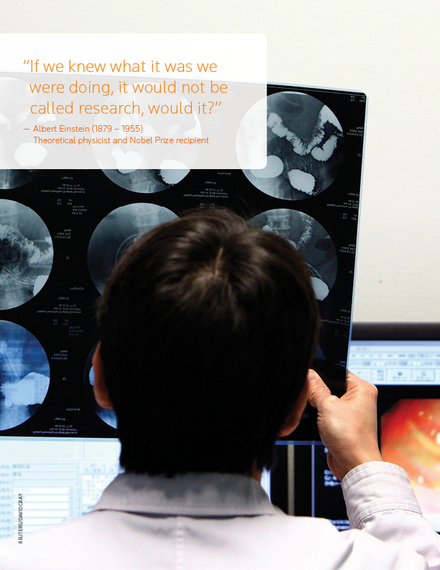Every year scientists and scholars, in the pursuit of knowledge and the requisite advancement of their careers, produce reams of published research. In 2013, for example, the Web of Science, Thomson Reuters' scholarly research and discovery platform, which covers the contents of more than 12,000 journals and other scholarly materials, indexed nearly 1.5 million articles (not to mention meeting abstracts, conference proceedings, editorials, and other items).
Given this torrent of output, the question is how one distinguishes the researchers whose work is making a mark among their fellow scientists from all the rest. One answer lies in the mandatory scholarly practice of footnoting, or citing, previous work when preparing one's own papers. Citations generally constitute acknowledgement of an intellectual debt -- a form of homage to the work being cited, whether as inspiration, influence, or a point of departure. A high citation total indicates that a paper has been judged to be significant and useful by the research community. Papers that are highly cited can therefore serve as pointers to notably influential researchers.
The Intellectual Property and Science business of Thomson Reuters has released a new report, "The World's Most Influential Scientific Minds 2014," a listing of authors who have written multiple highly cited reports and have thereby demonstrated that their work is central to ongoing research in their respective fields.
The report actually combines separate analyses reflecting two different time periods. A retrospective approach is taken in listings compiled for the new Thomson Reuters Highly Cited Researchers resource. Selection for this group centered on authors who, between 2002 and 2012, published multiple reports that ranked within the top 1 percent of the most-cited papers for their given subject field and the year of publication. More than 3,000 highly cited researchers in 21 main fields of science and the social sciences have been collected.
Also included in the "Influential Scientific Minds" report are scientists who have had a pronounced impact over the comparatively short term. These are the "hottest" researchers -- that is, researchers whose papers published over the last two years proved to be "hot," or cited at levels markedly above those of papers of comparable type and age published in the same journals, according to citations tallied during 2013. Seventeen authors made the grade by publishing as least 15 such reports. Among this group, genomics was the notably hot discipline, accounting for a dozen of the 17 scientists.
Significantly, the two lists overlap: Of the 17 hot researchers based on recent papers, 12 of the authors also appear among the highly cited researchers based on papers published since 2002. This demonstrates that in many instances of influential science, what's hot today will prove to be highly cited over the long haul.
